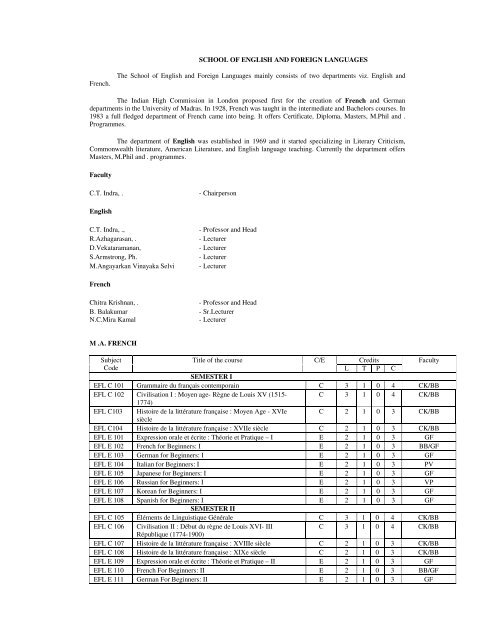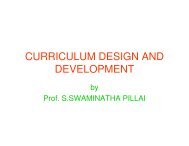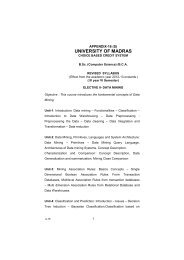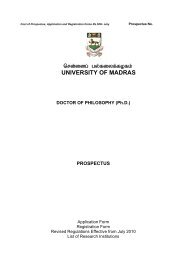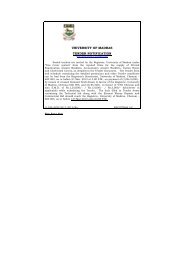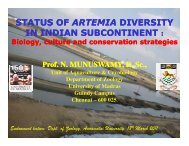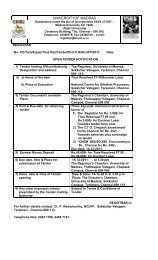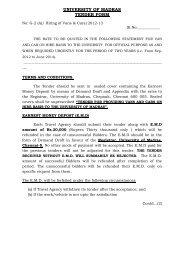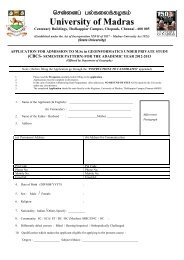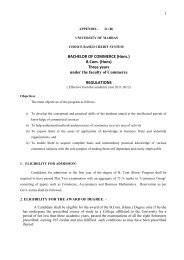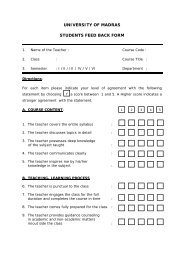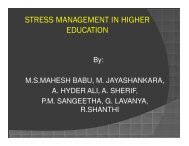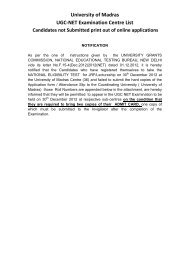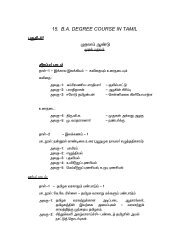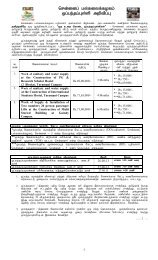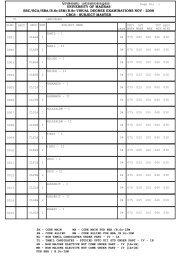School of English and Foreign Languages - University of Madras
School of English and Foreign Languages - University of Madras
School of English and Foreign Languages - University of Madras
Create successful ePaper yourself
Turn your PDF publications into a flip-book with our unique Google optimized e-Paper software.
SCHOOL OF ENGLISH AND FOREIGN LANGUAGES<br />
French.<br />
The <strong>School</strong> <strong>of</strong> <strong>English</strong> <strong>and</strong> <strong>Foreign</strong> <strong>Languages</strong> mainly consists <strong>of</strong> two departments viz. <strong>English</strong> <strong>and</strong><br />
The Indian High Commission in London proposed first for the creation <strong>of</strong> French <strong>and</strong> German<br />
departments in the <strong>University</strong> <strong>of</strong> <strong>Madras</strong>. In 1928, French was taught in the intermediate <strong>and</strong> Bachelors courses. In<br />
1983 a full fledged department <strong>of</strong> French came into being. It <strong>of</strong>fers Certificate, Diploma, Masters, M.Phil <strong>and</strong> .<br />
Programmes.<br />
The department <strong>of</strong> <strong>English</strong> was established in 1969 <strong>and</strong> it started specializing in Literary Criticism,<br />
Commonwealth literature, American Literature, <strong>and</strong> <strong>English</strong> language teaching. Currently the department <strong>of</strong>fers<br />
Masters, M.Phil <strong>and</strong> . programmes.<br />
Faculty<br />
C.T. Indra, .<br />
- Chairperson<br />
<strong>English</strong><br />
C.T. Indra, .,<br />
R.Azhagarasan, .<br />
D.Vekataramanan,<br />
S.Armstrong, Ph.<br />
M.Angayarkan Vinayaka Selvi<br />
- Pr<strong>of</strong>essor <strong>and</strong> Head<br />
- Lecturer<br />
- Lecturer<br />
- Lecturer<br />
- Lecturer<br />
French<br />
Chitra Krishnan, .<br />
- Pr<strong>of</strong>essor <strong>and</strong> Head<br />
B. Balakumar - Sr.Lecturer<br />
N.C.Mira Kamal<br />
- Lecturer<br />
M .A. FRENCH<br />
Subject<br />
Title <strong>of</strong> the course<br />
C/E Credits<br />
Faculty<br />
Code<br />
L T P C<br />
SEMESTER I<br />
EFL C 101 Grammaire du français contemporain C 3 1 0 4 CK/BB<br />
EFL C 102 Civilisation I : Moyen age- Règne de Louis XV (1515- C 3 1 0 4 CK/BB<br />
1774)<br />
EFL C103 Histoire de la littérature française : Moyen Age - XVIe C 2 1 0 3 CK/BB<br />
siècle<br />
EFL C104 Histoire de la littérature française : XVIIe siècle C 2 1 0 3 CK/BB<br />
EFL E 101 Expression orale et écrite : Théorie et Pratique – I E 2 1 0 3 GF<br />
EFL E 102 French for Beginners: I E 2 1 0 3 BB/GF<br />
EFL E 103 German for Beginners: I E 2 1 0 3 GF<br />
EFL E 104 Italian for Beginners: I E 2 1 0 3 PV<br />
EFL E 105 Japanese for Beginners: I E 2 1 0 3 GF<br />
EFL E 106 Russian for Beginners: I E 2 1 0 3 VP<br />
EFL E 107 Korean for Beginners: I E 2 1 0 3 GF<br />
EFL E 108 Spanish for Beginners: I E 2 1 0 3 GF<br />
SEMESTER II<br />
EFL C 105 Éléments de Linguistique Générale C 3 1 0 4 CK/BB<br />
EFL C 106 Civilisation II : Début du règne de Louis XVI- III<br />
C 3 1 0 4 CK/BB<br />
République (1774-1900)<br />
EFL C 107 Histoire de la littérature française : XVIIIe siècle C 2 1 0 3 CK/BB<br />
EFL C 108 Histoire de la littérature française : XIXe siècle C 2 1 0 3 CK/BB<br />
EFL E 109 Expression orale et écrite : Théorie et Pratique – II E 2 1 0 3 GF<br />
EFL E 110 French For Beginners: II E 2 1 0 3 BB/GF<br />
EFL E 111 German For Beginners: II E 2 1 0 3 GF
EFL E 112 Italian For Beginners: II E 2 1 0 3 PV<br />
EFL E 113 Japanese For Beginners: II E 2 1 0 3 GF<br />
EFL E 114 Russian For Beginners: II E 2 1 0 3 VP<br />
EFL E 115 Korean for Beginners: II E 2 1 0 3 GF<br />
EFL E 116 Spanish for Beginners: II E 2 1 0 3 GF<br />
SEMESTER III<br />
EFL C 109 Civilisation III (1900-2000) C 3 1 0 4 CK/BB<br />
EFL C 110 Histoire de la littérature française -XXe siècle- Roman et C 2 1 0 3 CK/BB<br />
critique<br />
EFL C 111 Histoire de la littérature française -XXe siècle - Théâtre et C 2 1 0 3 CK/BB<br />
Poésie<br />
EFL C 112 Francophonie et les Littératures francophones C 3 1 0 4 CK/BB<br />
EFL E 117 Gr<strong>and</strong>s Mouvements artistiques en France : I E 2 1 0 3 GF<br />
EFL E 118 Stage - Practical Summer Internship E 0 0 3 3 CK<br />
EFL E 119 French For Beginners: III E 2 1 0 3 BB/GF<br />
EFL E 120 German For Beginners: III E 2 1 0 3 GF<br />
EFL E 121 Italian For Beginners: III E 2 1 0 3 PV<br />
EFL E 122 Japanese For Beginners: III E 2 1 0 3 GF<br />
EFL E 123 Russian For Beginners: III E 2 1 0 3 VP<br />
EFL E 124 Korean for Beginners: III E 2 1 0 3 GF<br />
EFL E 125 Spanish for Beginners: III E 2 1 0 3 GF<br />
SEMESTER IV<br />
EFL C 113 Initiation à la traduction C 3 1 0 4 CK/GF<br />
EFL C 114 Didactique du français langue étrangère C 3 1 0 4 CK/GF<br />
EFL C 115 Dissertation C 6 0 0 6 CK/BB<br />
EFL E 126 Gr<strong>and</strong>s Mouvements artistiques en France : II E 2 1 0 3 GF<br />
EFL E 127 French For Beginners: IV E 2 1 0 3 BB/GF<br />
EFL E 128 German For Beginners: IV E 2 1 0 3 GF<br />
EFL E 129 Italian For Beginners: IV E 2 1 0 3 PV<br />
EFL E 130 Japanese For Beginners: IV E 2 1 0 3 GF<br />
EFL E 131 Russian For Beginners: IV E 2 1 0 3 VP<br />
EFL E 132 Korean for Beginners: IV E 2 1 0 3 GF<br />
EFL E 133 Spanish for Beginners: IV E 2 1 0 3 GF<br />
MASTERS COURSES : ABSTRACT<br />
EFL C 101 Grammaire du français contemporain C 3 1 0 4 CK/BB<br />
The course seeks to Consolidate the knowledge <strong>of</strong> theoretical aspects <strong>of</strong> French grammar with examples<br />
provided from different angles: from ancient literature, present day literature, day to day conversation Improve<br />
their oral <strong>and</strong> written skills through a combination <strong>of</strong> theory <strong>and</strong> practise. Extend <strong>and</strong> exp<strong>and</strong> their savoir-faire<br />
through the acquisition <strong>of</strong> latest skills <strong>and</strong> techniques by practical training<br />
EFL C 102 Civilisation I : Moyen age- Règne de Louis XV (1515-1774) C 3 1 0 4 CK/BB<br />
This course seeks to present the evolution <strong>and</strong> the diverse aspects that go to make up the French culture<br />
from the Middle Ages to the reign <strong>of</strong> Louis XV so as to relate the influence <strong>of</strong> social <strong>and</strong> other imperatives on<br />
authors <strong>and</strong> literacy movements <strong>of</strong> these epochs through a study <strong>of</strong> The historical events have shaped France The<br />
economic, political <strong>and</strong> social transformations that have taken place over the years. The rural <strong>and</strong> urban scenario<br />
The relations between the social, technological <strong>and</strong> cultural phenomenon that have influenced French literature <strong>and</strong><br />
philosophy.<br />
EFL C104 Histoire de la littérature française : Moyen Age - XVIe siècle C 2 1 0 3 CK/BB<br />
The Middle Ages <strong>and</strong> the Renaissance saw the birth <strong>of</strong> various genres <strong>of</strong> a literature that later flourished<br />
<strong>and</strong> grew. This course therefore seeks to: Study in a comprehensive manner the literature <strong>of</strong> this period. Perceive<br />
the evolution <strong>of</strong> the different literary genres during this epochTrace the lasting influence <strong>of</strong> the Pleiade on French<br />
literature Undertake an in-depth study <strong>and</strong> analysis <strong>of</strong> the works <strong>of</strong> representative writers
EFL C 107 Histoire de la littérature française : XVIIIe siècle C 2 1 0 3 CK/BB<br />
Three important phases <strong>of</strong> literary evolution marked XVII century France: the Romanesque <strong>and</strong> baroque<br />
age, the classical age <strong>and</strong> the awakening <strong>of</strong> the philosophical spirit. This course seeks therefore to Study the<br />
preoccupation with the development <strong>of</strong> the language <strong>and</strong> literature Trace the philosophical trends. Gain an insight<br />
into the aesthetic sensibility <strong>of</strong> the French writers Undertake an in-depth analysis <strong>of</strong> the works <strong>of</strong> representative<br />
writers<br />
EFL E 101 Expression orale et écrite : Théorie et Pratique – II E 2 1 0 3 GF<br />
This course is designed so as to transmit a strong theoretical foundation on the techniques <strong>of</strong> expression<br />
<strong>and</strong> communication in French both oral <strong>and</strong> written. The course therefore consists <strong>of</strong>: An introduction to the basic<br />
theory. An initiation to technical terms <strong>and</strong> expressions. llustration through Practical exercises.<br />
EFL E 102 French for Beginners: I E 2 1 0 3 BB/GF<br />
At a time when the knowledge <strong>of</strong> a foreign language has become an indispensable tool, this course in<br />
French will give an opportunity for students <strong>of</strong> other disciplines to get a basic knowledge <strong>of</strong> a widely used<br />
European language. The course therefore seeks to Give an introduction to the French language through the<br />
communicative approach Enable the beginners to have a working knowledge <strong>of</strong> French both oral <strong>and</strong> written<br />
Facilitate the practical use <strong>of</strong> the language skills acquired in specific real life situations.<br />
EFL E 103 German for Beginners: I E 2 1 0 3 GF<br />
This course in German will give an opportunity for students <strong>of</strong> other disciplines to acquire basic<br />
linguistic skills <strong>and</strong> a working knowledge <strong>of</strong> a widely used European language.<br />
EFL E 104 Italian for Beginners: I E 2 1 0 3 PV<br />
This cour se in Italian will give an opportunity for students <strong>of</strong> other disciplines to acquire basic linguistic<br />
skills <strong>and</strong> a working knowledge <strong>of</strong> a widely used European language.<br />
EFL E 105 Japanese for Beginners: I E 2 1 0 3 GF<br />
This course in Japanese will give an opportunity for students <strong>of</strong> other disciplines to get a basic<br />
knowledge in Japanese. The basic structure <strong>and</strong> script will be taught: Hiragana & Katakana.<br />
EFL E 106 Russian for Beginners: I E 2 1 0 3 VP<br />
This course in Russian will give an opportunity for students <strong>of</strong> other disciplines to get basic linguistic<br />
skills <strong>and</strong> a working knowledge <strong>of</strong> a widely used European language.<br />
EFL E 107 Korean for Beginners: I E 2 1 0 3 GF<br />
This course in Korean will give an opportunity for students <strong>of</strong> other disciplines to get basic linguistic<br />
skills <strong>and</strong> a working knowledge <strong>of</strong> a language widely used in Asia <strong>and</strong> by the various multinationals from Korea<br />
whose presence here is increasing steadily.<br />
EFL E 108 Spanish for Beginners: I E 2 1 0 3 GF<br />
This course in Spanish will give an opportunity for students <strong>of</strong> other disciplines to get basic linguistic<br />
skills <strong>and</strong> a working knowledge <strong>of</strong> a widely used European language.<br />
EFL C 105 Éléments de Linguistique Générale C 3 1 0 4 CK/BB<br />
This is an initiation into the world <strong>of</strong> linguistics <strong>and</strong> covers all the basic aspects <strong>of</strong> the scientific study <strong>of</strong><br />
human language. It involves the study <strong>of</strong> the basic concepts <strong>of</strong> the science <strong>of</strong> communication <strong>and</strong> the exploration<br />
<strong>of</strong> its links with other social sciences. This course therefore proposes the theoretical study <strong>of</strong> the various aspects<br />
that make up the science <strong>of</strong> language <strong>and</strong> the practical application <strong>of</strong> the various theories.<br />
EFL C 106<br />
Civilisation II : Début du règne de Louis XVI- III<br />
République (1774-1900)<br />
C 3 1 0 4 CK/BB<br />
This course seeks to present the origin <strong>and</strong> growth <strong>of</strong> the geographical entity that we now as France<br />
today. This involves a study <strong>of</strong> the diverse aspects that go to make up the French society <strong>and</strong> the various
dimensions <strong>of</strong> French civilisation. It also traces how culture <strong>and</strong> civilisation in France has evolved down the ages<br />
from Prehistoric times to the Mid XVIIIth century. It includes therefore a study <strong>of</strong> : a) the major social, historical<br />
<strong>and</strong> political events <strong>of</strong> this epoch b) some aspects <strong>of</strong> everyday life in France during this period c) scientific <strong>and</strong><br />
technical advances made during this period d) the evolution <strong>of</strong> arts <strong>and</strong> literature during this period.<br />
EFL C 107 Histoire de la littérature française : XVIIIe siècle C 2 1 0 3 CK/BB<br />
The XVIII century France was an age known as that <strong>of</strong> philosophers. During this century one sees the<br />
progress <strong>of</strong> the philosophical spirit in t<strong>and</strong>em with the classical school <strong>of</strong> thought. The age drew to a close when<br />
the romantic sensibility made its appearance. This course seeks therefore to Study the influence <strong>of</strong> philosophy <strong>and</strong><br />
literary creation Trace the gradual emergence <strong>of</strong> remarkable literary trends. Gain an insight into the aesthetic<br />
sensibility <strong>of</strong> the French writers<br />
EFL C 108 Histoire de la littérature française : XIXe siècle C 2 1 0 3 CK/BB<br />
The turbulent history <strong>of</strong> France is reflected in the literature <strong>of</strong> this period through the transition from<br />
philosophy to romanticism. The second half saw the currents pf positivism, realism, idealism <strong>and</strong> symbolism with<br />
a wealth <strong>of</strong> literary production that saw strongly opposed schools <strong>of</strong> thought emerging.<br />
EFL E 109 Expression orale et écrite : Théorie et Pratique – II E 2 1 0 3 GF<br />
This course goes one step further by permitting the students to acquire <strong>and</strong> initiation into the art <strong>of</strong><br />
discourse including observation, underst<strong>and</strong>ing, learning, presentation <strong>and</strong> correction. This course thus enables the<br />
students to acquire the essential skills for Organising information. Transmitting information in different contexts.<br />
Adopting the French “mise en forme”.<br />
EFL E 110 French For Beginners: II E 2 1 0 3 BB/GF<br />
A continuation <strong>of</strong> the study <strong>of</strong> the French language embarked upon in the earlier semester that will help<br />
the student gain access to another culture <strong>and</strong> civilisation.<br />
EFL E 111 German For Beginners: II E 2 1 0 3 GF<br />
A continuation <strong>of</strong> the study <strong>of</strong> the German language embarked upon in the earlier semester that will help<br />
the student gain access to another culture <strong>and</strong> civilisation.<br />
EFL E 112 Italian For Beginners: II E 2 1 0 3 PV<br />
A continuation <strong>of</strong> the study <strong>of</strong> the Italian language embarked upon in the earlier semester that will help<br />
the student gain access to another culture <strong>and</strong> civilisation.<br />
EFL E 113 Japanese For Beginners: II E 2 1 0 3 GF<br />
A continuation <strong>of</strong> the study <strong>of</strong> the Japanese language embarked upon in the earlier semester that will<br />
help the student gain access to another culture <strong>and</strong> civilisation.<br />
EFL E 114 Russian For Beginners: II E 2 1 0 3 VP<br />
A continuation <strong>of</strong> the study <strong>of</strong> the Russian language embarked upon in the earlier semester that will help<br />
the student gain access to another culture <strong>and</strong> civilisation.<br />
EFL E 115 Korean for Beginners: II E 2 1 0 3 GF<br />
A continuation <strong>of</strong> the study <strong>of</strong> the Korean language embarked upon in the earlier semester that will help<br />
the student gain access to another culture <strong>and</strong> civilisation<br />
EFL E 116 Spanish for Beginners: II E 2 1 0 3 GF<br />
A continuation <strong>of</strong> the study <strong>of</strong> the Spanish language embarked upon in the earlier semester that will help<br />
the student gain access to another culture <strong>and</strong> civilisation<br />
EFL C 109 Civilisation III (1900-2000) C 3 1 0 4 CK/BB<br />
The study <strong>of</strong> an epoch torn apart by the two world wars <strong>and</strong> under the ever-growing threat <strong>of</strong> cataclysmic<br />
events is essential to a student <strong>of</strong> French literature since these events moulded the literature <strong>of</strong> the XX century <strong>and</strong>
set the tone for future creations. This course seeks to present the diverse aspects that go to make up contemporary<br />
French society through a study <strong>of</strong> various aspects including The social, historic <strong>and</strong> political events from 1918<br />
through May 1968 to the present day. French i stitutions –role <strong>and</strong> functions The identity <strong>and</strong> status <strong>of</strong> France in<br />
the European union The socio cultural problems related to features such as immigration, unemployment<br />
EFL C 110<br />
Histoire de la littérature française -XXe siècle- Roman et<br />
critique<br />
C 2 1 0 3 CK/BB<br />
The 20 th century was marked by experimentation <strong>and</strong> the remarkable development <strong>of</strong> the novel as a<br />
literary form. The novelists who painted contemporary customs <strong>and</strong> traditions had liberal, socialist <strong>and</strong> diverse<br />
tendencies. The abundance <strong>of</strong> schools <strong>of</strong> thought in the domain <strong>of</strong> criticism reveals the richness <strong>of</strong> literary culture<br />
existing in France. A study <strong>of</strong> these tendencies is essential to an underst<strong>and</strong>ing <strong>of</strong> the literature <strong>of</strong> France <strong>and</strong> to<br />
place it in the context <strong>of</strong> world literature. This course therefore seeks to ,Present a panoramic view <strong>of</strong> the<br />
development <strong>of</strong> the novel <strong>and</strong> literary criticism during the 20th century. Conduct a detailed study <strong>of</strong> great novelists<br />
<strong>and</strong> critics <strong>and</strong> monumental works that have marked the world literary arena.<br />
EFL C 111<br />
Histoire de la littérature française -XXe siècle - Théâtre et<br />
Poésie<br />
C 2 1 0 3 CK/BB<br />
This course has the ambitious objective <strong>of</strong> introducing two genres – theatre <strong>and</strong> poetry, both have which<br />
have illustrious names in the pantheon <strong>of</strong> French literature in the XX century. The reformation <strong>of</strong> the theatrical<br />
scenario with the introduction <strong>of</strong> technical <strong>and</strong> artistic innovation wrought major changes in the dramatic creation.<br />
The poetic creations revealed the anguish <strong>and</strong> confusion <strong>of</strong> a world that had been disrupted <strong>and</strong> poetry sought new<br />
forms <strong>of</strong> expression. In theatre as in poetry the course intends to undertake An in-depth study <strong>and</strong> analysis <strong>of</strong> the<br />
works <strong>of</strong> representative dramatists/poets who have dominated the 20 th century. A study <strong>of</strong> important extracts that<br />
give an accurate representation <strong>of</strong> the art <strong>and</strong> philosophy <strong>of</strong> the authors.<br />
EFL C 112 Francophonie et les Littératures francophones C 3 1 0 4 CK/BB<br />
Francophonie is a modern movement that is gaining momentum, importance <strong>and</strong> international<br />
recognition in the political, social, economic <strong>and</strong> literary fronts. The course therefore seeks to Glean an<br />
underst<strong>and</strong>ing <strong>of</strong> the concept <strong>and</strong> the movement <strong>of</strong> Francophonie. Give a panoramic view <strong>of</strong> the various literatures<br />
that are included in this field. Open up avenues that can be explored for future research Allow the student to<br />
underst<strong>and</strong> the truly unique phenomenon namely World French Literature.<br />
EFL E 117 Gr<strong>and</strong>s Mouvements artistiques en France : I E 2 1 0 3 GF<br />
The history <strong>of</strong> Art <strong>of</strong> France reveals unfathomed treasures <strong>and</strong> will certainly serve to promote a better<br />
underst<strong>and</strong>ing <strong>of</strong> the aesthetic vision imbibed by the artists <strong>of</strong> this epoch. The course will include a study <strong>of</strong><br />
Romanesque <strong>and</strong> Gothic architecture, the art <strong>of</strong> Renaissance <strong>and</strong> Classical Art <strong>of</strong> the XVII <strong>and</strong> XVIII centuries.<br />
EFL E 118 Stage - Practical Summer Internship E 0 0 3 3 CK<br />
This practical application <strong>of</strong> the linguistic <strong>and</strong> cultural skills acquired will be done over a 40 day<br />
internship with any French based company/ NGO /Bank /organisation so that the student obtains a h<strong>and</strong>s-on<br />
experience. The course evaluation will be based partly on the evaluation submitted by the head <strong>of</strong> the organization<br />
where the student did the internship <strong>and</strong> will include the submission <strong>of</strong> a report <strong>and</strong> a viva voce.<br />
EFL E 119 French For Beginners: III E 2 1 0 3 BB/GF<br />
A further study <strong>of</strong> French will allow the student to acquire sufficient skills in the language, to give him<br />
autonomy in its practice <strong>and</strong> future use.<br />
EFL E 120 German For Beginners: III E 2 1 0 3 GF<br />
A further study <strong>of</strong> German will allow the student to acquire sufficient skills in the language, to give him<br />
autonomy in its practice <strong>and</strong> future use.<br />
EFL E 121 Italian For Beginners: III E 2 1 0 3 PV<br />
A further study <strong>of</strong> Italian will allow the student to acquire sufficient skills in the language, to give him<br />
autonomy in its practice <strong>and</strong> future use.
EFL E 122 Japanese For Beginners: III E 2 1 0 3 GF<br />
A further study <strong>of</strong> Japanese will allow the student to acquire sufficient skills in the language, to give him<br />
autonomy in its practice <strong>and</strong> future use.<br />
EFL E 123 Russian For Beginners: III E 2 1 0 3 VP<br />
A further study <strong>of</strong> Russian will allow the student to acquire sufficient skills in the language, to give him<br />
autonomy in its practice <strong>and</strong> future use.<br />
EFL E 124 Korean for Beginners: III E 2 1 0 3 GF<br />
A further study <strong>of</strong> Korean will allow the student to acquire sufficient skills in the language, to give him<br />
autonomy in its practice <strong>and</strong> future use.<br />
EFL E 125 Spanish for Beginners: III E 2 1 0 3 GF<br />
A further study <strong>of</strong> Spanish will allow the student to acquire sufficient skills in the language, to give him<br />
autonomy in its practice <strong>and</strong> future use.<br />
EFL C 113 Initiation à la traduction C 3 1 0 4 CK/GF<br />
This course seeks to give the learners an initiation into the theory <strong>and</strong> practice <strong>of</strong> the art <strong>of</strong> translation.<br />
The course therefore involves : the study <strong>of</strong> the “notions de base” <strong>of</strong> translation the study <strong>of</strong> the techniques <strong>of</strong><br />
translation the study <strong>of</strong> the theories <strong>of</strong> translation: linguistic <strong>and</strong> interpretative.<br />
EFL C 114 Didactique du français langue étrangère C 3 1 0 4 CK/GF<br />
The course seeks to prepare the learners for an essential underst<strong>and</strong>ing <strong>of</strong> the diverse aspects <strong>of</strong><br />
pedagogy <strong>of</strong> languages. It has therefore a two pronged approach being at once both linguistic <strong>and</strong> methodological.<br />
The course therefore involves : a critical description <strong>of</strong> the methodologies <strong>of</strong> FLE based on a linguistic approach<br />
(méthode grammaire-traduction, méthode directe, méthode audio-orale, méthode audio-visuelle <strong>and</strong> approche<br />
communicative) a coherent <strong>and</strong> rational initiation into practical application <strong>of</strong> the theories<br />
EFL C 115 Dissertation C 6 0 0 6 CK/BB<br />
This helps the student prepare an independent, thorough <strong>and</strong> guided in-depth study in the chosen field<br />
<strong>and</strong> submit a coherent <strong>and</strong> concise report <strong>of</strong> the activities. It also enables the student to come to terms with his/her<br />
potential for academic research, sustained study <strong>and</strong> original thinking. This paper is therefore an essential<br />
component for post-graduate study.<br />
EFL E 126 Gr<strong>and</strong>s Mouvements artistiques en France : II E 2 1 0 3 GF<br />
The course continues the in-depth study <strong>and</strong> analysis <strong>of</strong> the artistic vision <strong>of</strong> France <strong>and</strong> will sensitise the<br />
students to the creative forces that governed the <strong>and</strong> XIX <strong>and</strong> X centuries including “Romantisme”, “Réalisme”,<br />
“Impressionnisme, ” Surréalisme”, “Fauvisme” <strong>and</strong> “Cubisme”among other movements<br />
EFL E 127 French For Beginners: IV E 2 1 0 3 BB/GF<br />
The course will consolidate the skills acquired in French in the three preceding semesters <strong>and</strong> enable the<br />
students to develop pr<strong>of</strong>iciency in communication.<br />
EFL E 128 German For Beginners: IV E 2 1 0 3 GF<br />
The course will consolidate the skills acquired in German in the three preceding semesters <strong>and</strong> enable<br />
the students to develop pr<strong>of</strong>iciency in communication.<br />
EFL E 129 Italian For Beginners: IV E 2 1 0 3 PV<br />
The course will consolidate the skills acquired in Italian in the three preceding semesters <strong>and</strong> enable the<br />
students to develop pr<strong>of</strong>iciency in communication.
EFL E 130 Japanese For Beginners: IV E 2 1 0 3 GF<br />
The course will consolidate the skills acquired in Japanese in the three preceding semesters <strong>and</strong> enable<br />
the students to develop pr<strong>of</strong>iciency in communication.<br />
EFL E 131 Russian For Beginners: IV E 2 1 0 3 VP<br />
The course will consolidate the skills acquired in Russian in the three preceding semesters <strong>and</strong> enable the<br />
students to develop pr<strong>of</strong>iciency in communication.<br />
EFL E 132 Korean for Beginners: IV E 2 1 0 3 GF<br />
The course will consolidate the skills acquired in Korean in the three preceding semesters <strong>and</strong> enable the<br />
students to develop pr<strong>of</strong>iciency in communication.<br />
EFL E 133 Spanish for Beginners: IV E 2 1 0 3 GF<br />
The course will consolidate the skills acquired in Spanish in the three preceding semesters <strong>and</strong> enable the<br />
students to develop pr<strong>of</strong>iciency in communication.<br />
M.A.ENGLISH<br />
Subject Code<br />
FIRST SEMESTER<br />
Name <strong>of</strong> the Subject C/E Credits Faculty<br />
L T P C<br />
EFL C001 <strong>English</strong> Poetry – I C 3 1 - 4 CTI<br />
EFL C002 Post-Colonial Theory <strong>and</strong> Literature C 3 1 - 4 RA/SA<br />
EFL C003 British Drama C 3 1 - 4 PR/SA<br />
EFL E001 Theatre E 2 - 1 3 PR<br />
EFL E002 Communication Skills (Listening <strong>and</strong> Speaking E 2 1 - 3 G.F.<br />
Skills)<br />
SECOND SEMESTER<br />
EFL C004 <strong>English</strong> Poetry – II C 4 1 - 5 CTI<br />
EFL C005 Language, Linguistics <strong>and</strong> Communication C 3 2 - 5 DV<br />
EFL C006 Shakespeare Studies C 3 2 - 5 CTI<br />
EFL E003 Dalit Issues E 2 1 - 3 RA<br />
EFL E004 Copy Editing E 2 1 - 1 DV<br />
EFL E005 <strong>English</strong> for Corporate Communication E 2 1 - 3 G.F.<br />
THIRD SEMESTER<br />
EFL C007 American Literature C 3 1 - 5 PR/DV<br />
EFL C008 Literary Criticism <strong>and</strong> Theory C 2 1 - 4 CTI/RA<br />
EFL C009 Victorian Prose <strong>and</strong> Its Critique <strong>of</strong> Materialism C 2 1 - 4 CTI/RA<br />
EFL E006 Rise <strong>of</strong> the <strong>English</strong> Novel & Its Development Upto E 2 1 - 3 DV<br />
19 th Century<br />
EFL E007 Indian Writing in <strong>English</strong> E 2 1 - 3<br />
EFL E008 Contemporary Indian Regional Writings in<br />
E 2 1 - 3 DV<br />
Translation<br />
EFL E009 <strong>English</strong> Language Teaching E 2 1 - 3 G.F.<br />
EFL E010 Technical Writing E 2 1 - 2 DV<br />
EFL E011 Creative Writing E 2 1 - 3 DV<br />
FOURTH SEMESTER<br />
EFL C010 The Modernist Movement <strong>and</strong> After C 3 1 - 4 CTI/RA<br />
EFL C011 Australian Writing: Texts <strong>and</strong> Contexts C 3 2 - 5 RA/GF<br />
EFL C012 Dissertation <strong>and</strong> Viva-voce C - 1 5 6 All Faculty<br />
EFL E012 Introduction to Canadian Studies E 2 1 - 3 SA<br />
EFL E013 Literature, Analysis, Approaches <strong>and</strong> Applications E 2 1 - 3 RA/SA<br />
EFL C001 <strong>English</strong> Poetry – I C 4 1 - 5 CTI<br />
This paper has the following objectives:<br />
[1] To examine the literary institutions that came up in the Elizabethan period promoting indigenization<br />
<strong>of</strong> European forms like the sonnet, the allegorical poem, the romance poem etc.
[2] To study how the political <strong>and</strong> socio- cultural forces acting in Engl<strong>and</strong> during that period determined<br />
to some extent the directions these literary forms took. In other words the over-all approach to the subject will<br />
combine the old historical method <strong>of</strong> studying literary forms as well as the New Historical method <strong>of</strong> examining<br />
the cultural practices which are also part <strong>of</strong> the "text" <strong>and</strong> no more mere background information. The paper will<br />
also look at the transition from the 16th to the 17th century when New Philosophy <strong>and</strong> New Science greatly<br />
influenced the Metaphysical poetry. In this context, the development <strong>of</strong> religious poetry will also be examined.<br />
[3] To survey the development <strong>of</strong> <strong>English</strong> Poetry from Chaucer to the 18 th Century.<br />
Middle <strong>English</strong> Poetry<br />
Chaucer: "The General Prologue": Lines 1-100 - Knight <strong>and</strong> Squire 118-162 - Nun (Prioress) 479-530 –<br />
Parson 165-207 – Monk 413-478 - Wife <strong>of</strong> Bath Additional Reading<br />
Doctor, Friar<br />
Elizabethan Poetry<br />
Ballads:<br />
Wyatt :<br />
Surrey :<br />
Spenser:<br />
Donne:<br />
The Wife <strong>of</strong> Usher's Well" <strong>and</strong> "Sir Patrick Spens"<br />
The long love that in my thought doth harbor"<br />
Love, that doth reign <strong>and</strong> live within my thought"<br />
Epithalamion"<br />
A Valediction: forbidding mourning" "The Canonization" "Flea" "Relic"<br />
Seventeenth Century Poetry<br />
John Milton<br />
Marvell:<br />
Herbert:<br />
“Paradise Lost” Book IX<br />
"Horatian Ode""To His Coy Mistress"<br />
"Collar"<br />
Eighteenth Century Poetry<br />
Dryden "Absalom <strong>and</strong> Achitophel" Lines 150 - 476<br />
Pope "Essay on Criticism" Lines 1 - 200<br />
Gray "Elegy"/"The Bard"/"On a Favourite Cat Drowned in a tub <strong>of</strong> Goldfishes"<br />
Collins "Ode to Evening" "Ode to Simplicity"<br />
Burns "Holy Willie's Prayer" "Auld Lang Syne" "Whistle <strong>and</strong> I'll come to you, My Lad" "For A' That"<br />
"Ae fond Kiss"<br />
EFL C002 Post-Colonial Theory <strong>and</strong> Literature C 3 1 - 4 RA/SA<br />
Description:<br />
This paper will introduce students to the current sociopolitical mood in `third-world' countries through<br />
the study <strong>of</strong> their fiction <strong>and</strong> poetry. Key authors <strong>and</strong> poets, largely representative <strong>of</strong> their native cultures, will be<br />
placed in their particular historical contexts. Emphasis will be laid on tracing the development <strong>of</strong> post-colonial<br />
literatures <strong>and</strong> theory. Specific works will also receive close textual analysis.<br />
Fiction<br />
1. Conrad : Heart <strong>of</strong> Darkness.<br />
2. E.M. Forster : A Passage to India.<br />
3. Achebe : Things Fall Apart.<br />
4. Salman Rushdi : Midnight's Children.<br />
5. Timothy Findley : Lemonade<br />
6. Thomas King : The One About Coyote Going West<br />
7.Samuel Selvon : The Lonely Londoners.<br />
8. Bapsi Sidhwa : Ice C<strong>and</strong>y Man.<br />
Poetry:<br />
Arun Kolatkar<br />
A.K. Ramanujan.<br />
K<strong>of</strong>i Awonoor<br />
Leopold Senghor<br />
Grace Nichols<br />
James Reaney<br />
George Bowering<br />
: The Priest, A Low Temple, Yeshwant Rao, An Old Woman, Scratch<br />
: Returning, Death <strong>of</strong> Poem, No Fifth Man, Birthdays, Farewells.<br />
: Easter Dawn, The Weaver Bird, Songs <strong>of</strong> Sorrow, Song <strong>of</strong> War<br />
: In Memoriam, Night <strong>of</strong> Sine, All Day Long<br />
: In My Name, Of course when they ask for poems about the ‘realities’ <strong>of</strong> black women,<br />
Praise Song for my Mother, Caribbean Women Prayer.<br />
: Maps<br />
: Gr<strong>and</strong> Father
Theory <strong>and</strong> Criticism:<br />
Macaulay's Minute <strong>of</strong> 1831/35. 2 Chapters / Essays from Post-Colonial Studies: eds. Ashcr<strong>of</strong>t et.al.<br />
Rajeswari Sud<strong>and</strong>ar on Sati<br />
EFL C003 British Drama C 3 1 - 4 PR/SA<br />
Description:<br />
This paper proposes to introduce to students the trends <strong>and</strong> movements in British Drama from 16 th<br />
Century to the present. It aims to focus on the socio-cultural context <strong>of</strong> these movements <strong>and</strong> the political factors<br />
that determine the history <strong>of</strong> theatre.<br />
Thomas Kyd -The Spanish Tragedy-Marlowe -Jew <strong>of</strong> Malta- Middleton & Rowley -The Changeling- Sheridan -<br />
The <strong>School</strong> For Sc<strong>and</strong>al -Synge-Playboy <strong>of</strong> the Western World -Shaun O’casey -Juno <strong>and</strong> the Paycock -Samuel<br />
Beckett-Waiting for Godot -Brecht-Mother Courage -Catherine Hayes / Shelagh Delaney -Skirmishes / A Taste <strong>of</strong><br />
Honey -Edward Bond –Lear-Caryl Churchill -Top Girls<br />
EFL E001 Theatre E 2 - 1 3 PR<br />
Description:<br />
In most Colleges drama is taught virtually the same way as one would teach a poem or a piece <strong>of</strong> prose<br />
fiction. Unlike other forms <strong>of</strong> literature, drama is meant to be performed if its multidimensional nature is to unfold<br />
itself. With this in mind, the course on theatre is designed with an accent on performance rather than on classroom<br />
teaching. In the absence <strong>of</strong> any infrastructure for theatre in the <strong>University</strong> <strong>of</strong> <strong>Madras</strong>, the course will confine itself<br />
only to those adjuncts <strong>of</strong> drama that can be highlight with our limited resources. The prescribed texts would be<br />
approached in a way that the students learn the intricacies <strong>of</strong> dialogue delivery, the subtle nuances <strong>of</strong> acting, stage<br />
setting, lighting <strong>and</strong> make-up. On the theoretical side, the students will be made to acquaint themselves with the<br />
history <strong>of</strong> drama from classical times to our own day. The plays chosen for study lend themselves to performance<br />
<strong>and</strong> theoretical discourse. A Greek play - Oedipus Rex (Sophocles) A Modern play - The Glass Menagerie (T.<br />
Williams) An Indian Play in translation - Nagam<strong>and</strong>ala (Girish Karnad)<br />
Note: To select this elective subject the students must pass an audition test. Not more than fifteen students will be<br />
admitted.<br />
EFL E002 Communication Skills (Listening <strong>and</strong> Speaking Skills) E 2 1 - 3 G.F.<br />
All oral communication is an exercise in public relations. This Course will explain, demonstrate <strong>and</strong> help<br />
learn the art <strong>of</strong> listening <strong>and</strong> speaking effectively. Areas <strong>of</strong> Oral Communication include: Introducing Oneself,<br />
Attending Employment Interview, Making & Attending Phone Calls, Conducting Interviews, Taking Notes at<br />
Meetings, Telemarketing, Working at a Call Centre, Making Business Presentations, Voice Over for Jingles <strong>and</strong><br />
Presentations, Public Speaking etc.<br />
EFL C004 <strong>English</strong> Poetry – II C 4 1 - 5 CTI<br />
This paper continues the survey <strong>of</strong> <strong>English</strong> Poetry from the Romantic movement to the present. It has also a postfeminist<br />
perspective in dealing with the modern women poets.<br />
Romantic Poetry<br />
1. William Blake: (1) Poems from Songs <strong>of</strong> Innocence <strong>and</strong> Experience 2. William Wordsworth: Immortality Ode<br />
Additional Reading: Wordsworth's shorter poems reflecting his social concerns such as Alice Fell, Convict, Poor Susan etc. 3.<br />
Coleridge: Dejection 4. Keats: Grecian Urn 5. Shelley: West Wind<br />
Victorian Poetry<br />
Tennyson : Lucretius"<br />
Browning : Andrea del Sarto”<br />
Arnold : Shakespeare" "Dover Beach" Thyrsis"<br />
Coventry Patmore : "The Angel in the House"<br />
Hopkins : "The Windhover"<br />
Elizabeth Barret Browning: "Sonnets from the Portugese": VIII "What can I Give Thee Back, O Liberal" XLIII "How do I Love<br />
Thee? Let me count the Ways"<br />
Christina Rossetti :<br />
Modern Poetry<br />
"The Goblin Market"<br />
Rupert Brooke : "The Soldier"<br />
Wilfred Owen : "Anthem for Doomed Youth"
W. H. Auden : "Elegy on the Death <strong>of</strong> W. B. Yeats" & "Musee des Beaux Arts"<br />
Dylan Thomas : "Do Not Go Gentle Into That Good Night" & "Poem in October"<br />
Philip Larkin : "Whitsun Weddings"<br />
Ted Hughes : "Hawk Roosting" & "Life After Death"<br />
Seamus Heaney : "Digging"<br />
Carol Ann Duffy : "St<strong>and</strong>ing Female Nude"<br />
Grace Nichols : "In My Name"<br />
Eavan Bol<strong>and</strong> : "Achilles Woman" / Her Essays to be given for studies<br />
EFL C005 Language, Linguistics <strong>and</strong> Communication C 3 2 - 5 DV<br />
Objectives:<br />
To equip the student with a basic knowledge <strong>of</strong> the structure <strong>of</strong> <strong>English</strong>: sentence constituents, formal vs functional analysis,<br />
tense, modality, aspect, articles, adjectives, subordination <strong>and</strong> coordination. -To provide the students with the theoretical<br />
background to phonetics <strong>and</strong> <strong>English</strong> phonology-To introduce the students to basic concepts in morphology, syntax,<br />
semantics<strong>and</strong> pragmatics.-To introduce him/her to some applications <strong>of</strong> linguistics.<br />
SECTION - A<br />
Phonetics: Organs <strong>of</strong> speech; The <strong>English</strong> Vowels, Consonants <strong>and</strong> Diphthongs; The Syllable; R.P.; Accent, Rhythm <strong>and</strong><br />
Intonation; Assimilation; Elision, Liaison <strong>and</strong> Juncture Phonetic Transcription.<br />
Morphology: Morphemes - Free <strong>and</strong> bound; Affixation; Inflection; Derivation; orphophonemics.<br />
Syntax: Parts <strong>of</strong> Speech; Functional Notions; ICanalysis; Transformations.<br />
4. Semantics: Synonymy, Antomymy, Hyponymy, Ambiguity.<br />
5. Pragmatics: Speech acts; The Co-operative Principle; Discourse analysis.<br />
6. Some Applications <strong>of</strong> Linguistics: Language teaching; contrastive analysis; analysis; stylistics; translation. To equip students<br />
in presentation skills. to facilitate team work <strong>and</strong> interpersonal communication.<br />
SECTION – B<br />
I. Theoretical background-Language <strong>and</strong> Communication-Non-verbal Communication-The Process <strong>of</strong> Communication-<br />
Communication Contexts: intra personal, interpersonal, group, organizational, public <strong>and</strong> mass Communication Barriers to<br />
Communication.<br />
II Aural _ Oral Communication- Diadic; Meetings; Seminars/Conferences; Group Discussion; Public Speaking;-<br />
Accent, Rhythm <strong>and</strong> Intonation.<br />
III Reading:<br />
Intensive <strong>and</strong> Extensive Reading.<br />
IV Writing:<br />
Business Correspondence; Reports; Notes;; Agendas <strong>and</strong> Minutes, Advertising <strong>and</strong> Job description; Graphic Aids.<br />
V Mechanics:<br />
Spelling, Punctuation.<br />
VI Common Errors.<br />
EFL C006 Shakespeare Studies C 3 2 - 5 CTI<br />
The objective <strong>of</strong> this paper is to read a chosen Shakespeare text in the light <strong>of</strong> cultural criticism which has emerged prominent<br />
in the last two decades. The approach would include ideological concepts from Feminist <strong>and</strong> Colonial <strong>and</strong> Post-Colonial<br />
discourses. It also means focussing on the impact <strong>of</strong> Post-Structuralism on Shakespeare Studies. Another objective <strong>of</strong> the<br />
paper is to choose plays to review the traditional concepts <strong>of</strong> genres like Romantic Comedy, the problem play etc. Thus the<br />
paper hopes to demonstrate how Shakespeare lends himself to all developing approaches, <strong>and</strong> hence his status as a canonical<br />
author. It also studies select sonnets.<br />
As You Like It-Measure for Measure- Hamlet- Coriolanus-Tempest-Shakespeare Sonnets-Critical Essays<br />
Granville-Barker : from Prefaces to Shakespeare.<br />
Ania Loomba : from Gender, Race <strong>and</strong> Renaissance Drama.<br />
Jonathan Dollimore: Essay on Measure for Measure from The Political Shakespeare.<br />
EFL E003 Dalit Issues E 2 1 - 3 RA<br />
This paper aims at introducing the student to the ideological <strong>and</strong> theoretical issues connected with the rise <strong>of</strong> the Dalit<br />
consciousness in India. A few relevant texts will be used to interrogate the problematic subject <strong>and</strong> to underst<strong>and</strong> its role in the<br />
changing social <strong>and</strong> cultural scene in contemporary India.
EFL E004 Copy Editing E 2 1 - 1 DV<br />
This course aims at equipping the students with the basic skills <strong>of</strong> editing as applicable in the field <strong>of</strong> publishing <strong>and</strong><br />
journalism. Students will have an overview <strong>of</strong> both these fields, develop the skill to spot errors <strong>and</strong> become sensitive to the<br />
<strong>English</strong> language. The focus will be on developing the students’ ability to edit <strong>and</strong> prepare a manuscript for publication. In the<br />
process, emphasis will naturally be on the nuances <strong>of</strong> the language <strong>and</strong> how effectively one uses a language.<br />
EFL E005 <strong>English</strong> for Corporate Communication E 2 1 - 3 G.F.<br />
This Elective provides a basic grounding in the principles <strong>of</strong> Corporate Communication <strong>and</strong> the effective use <strong>of</strong> Written<br />
<strong>English</strong> to achieve the desired Corporate goals. Students will be introduced to the various forms <strong>of</strong> internal <strong>and</strong> external Corporate<br />
Communication. They will also be introduced to the tools <strong>of</strong> writing, including the appropriate tone <strong>of</strong> voice, vocabulary <strong>and</strong><br />
structure appropriate to the target audience <strong>and</strong> the context <strong>of</strong> communication.-Areas <strong>of</strong> Internal Communication include: writing<br />
Resumes, Cover Letters, Notices & Announcements, Employee Relations Documents, Motivational Documents for Marketing &<br />
Agency Force, Project Reports, Progress Reports, Audio-Visual Presentation, Editing Newsletters for Employees.<br />
Areas <strong>of</strong> External Communication include: writing Customer Service Letters, Proposals, Business Reports for External Agencies,<br />
Goal Statements, Policy Statements, Mission Statements, Business Invitations, Press Releases, Editing a Newsletter for Investors<br />
& Clients, Editing Annual Reports, Leaflets & Advertisements etc.<br />
EFL C007 American Literature C 3 1 - 5 PR/DV<br />
This is a survey paper <strong>and</strong> an attempt will be made to provide an overview <strong>of</strong> major authors <strong>and</strong> the literary schools<br />
they belong to. We begin with Walt Whitman, who by common consent is the father <strong>of</strong> American poetry <strong>and</strong> who has<br />
influenced a host <strong>of</strong> American poets <strong>of</strong> the subsequent generations. On the same consideration Poe <strong>and</strong> O'Neill have been<br />
chosen for study. Each writer included in the syllabus has made a significant contribution to the development <strong>of</strong> American<br />
literature. Even as we deal with their works, there will be a discourse on the social <strong>and</strong> political events that have a bearing on<br />
their writing - in that sense the paper has a two-fold thrust. The students will be exposed to the main literary genres (poetry,<br />
drama <strong>and</strong> prose-fiction) - with only representative authors being chosen for study.<br />
Poetry<br />
Walt Whitman : Out <strong>of</strong> the cradle endlessly rocking / Passage to India.<br />
Emily Dickinson : The last night that she lived -The soul selects her own society -I dreaded the first robin, so<br />
Anne Bradstreet : The Prologue<br />
Frost<br />
: Home Burial-After Apple-picking<br />
Wallace Stevens : Thirteen ways <strong>of</strong> looking at blackbird / Peter Quince at the Clavier.<br />
Robert Lowell : Skunk Hour<br />
Sylvia Plath<br />
: Lady Lazarus, Daddy, Ariel<br />
Denise Levertow : Scenario-Thinking About El Salvador<br />
Adrienne Rich : Snapshots <strong>of</strong> a Daughter-in-LawAmy Tan (1952 - ) Mother Tongue (essay pp.922-926 from the<br />
Adventures in American Literature. Holt, Rine Hart 1996)<br />
Joy Harjo<br />
: Remember, I give you back<br />
Leslie Marmon Silko : Story from Bear Country<br />
Victor Hern<strong>and</strong>ez Cruz : Today is a day <strong>of</strong> great joy Drama<br />
O'Neill<br />
: The Emperor Jones / Desire Under the Elms<br />
Miller<br />
: Death <strong>of</strong> a Salesman / All My Sons<br />
Williams<br />
: A Streetcar Named Desire / The Glass Menagerie<br />
Ntozake Shange : For Colored Girl Fiction<br />
Poe<br />
: The Cask <strong>of</strong> Amontillado<br />
Hawthorne<br />
: The Birth Mark<br />
Melville<br />
: Bartleby the Scrivener<br />
Faulkner<br />
: As I lay Dying<br />
Saul Bellow<br />
: Herzog Prose<br />
Amy Tan<br />
: Mother Tongue<br />
Emason<br />
: The American Scholar<br />
EFL C008 Literary Criticism <strong>and</strong> Theory C 2 1 - 4 CTI/RA<br />
The paper aims at acquainting the student <strong>of</strong> literature with the conceptual premises <strong>of</strong> literary appreciation. Hence, it<br />
examines seminal literary critics in terms <strong>of</strong> representative samples to show how the concepts <strong>of</strong> imitation <strong>and</strong> creation constitute<br />
the two poles <strong>of</strong> literary criticism. The objective <strong>of</strong> this paper is also to place the study <strong>of</strong> literature in the context <strong>of</strong> changing<br />
historical perspectives on man, his self, society <strong>and</strong> the impact <strong>of</strong> ideology on reading practices. Hence, this paper proposes to<br />
examine texts from the classical humanist tradition, the liberal tradition <strong>and</strong> the later writings belonging to economic <strong>and</strong> political<br />
traditions which provide a critique <strong>of</strong> Enlightenment.<br />
Part I - Literary Criticism
1. Sydney : Apologie for Poetry.<br />
2. Johnson : Preface to Shakespeare.<br />
3. Wordsworth : Preface to the Lyrical Ballads.<br />
4. Coleridge : Biographia Literaria (Chapter 14).<br />
5. Keats : Letters.<br />
6. Shelley : Defence <strong>of</strong> Poetry.<br />
7. Henry James : Art <strong>of</strong> Fiction.<br />
8. Eliot : Tradition <strong>and</strong> the Individual Talent.<br />
9. Cleanth Brooks : The Language <strong>of</strong> Paradox.<br />
10. Edmund Wilson : Marxism <strong>and</strong> Literature.<br />
11. Northrop Frye : Archetypes <strong>of</strong> Literature.<br />
Part II - Literary Theory<br />
1. Rol<strong>and</strong> Barthes : Death <strong>of</strong> the Author/Foucault: What is an author.<br />
2. Edward Said : Crisis (in Orientalism) in David Lodge's Modern Literary Theory.<br />
3. V. Woolf : A Room <strong>of</strong> One's Own (one extract)<br />
4. Elaine Showalter : Toward a Feminist Poetics.<br />
5. Audre Lorde : Learning from 60s.<br />
EFL C009 Victorian Prose <strong>and</strong> Its Critique <strong>of</strong> Materialism C 2 1 - 4 CTI/RA<br />
The paper plans to explore the alternative model <strong>of</strong> Enlightenment <strong>of</strong>fered by the Victorian prose writers. The<br />
contribution <strong>of</strong> the thinkers <strong>of</strong> the Victorian Age was undermined early in the 20th century because <strong>of</strong> the influence <strong>of</strong> T.S. Eliot<br />
<strong>and</strong> the Modernist Movement. However since the 70s significant revolutions <strong>of</strong> Victorian thought have been published doing<br />
justice to the intellectual merit <strong>and</strong> the socio-cultural relevance <strong>of</strong> their thought to our democratic age. The early Victorian Prose<br />
writers like Carlyle highlighted the virtue <strong>of</strong> tradition <strong>and</strong> aristocracy which will help contain a revolution simmering under the<br />
discontent <strong>of</strong> the working class. Cardinal Newman earnestly argued against the virtues <strong>of</strong> Liberalism <strong>and</strong> pleaded for<br />
restoration <strong>of</strong> religious faith to stem the tide <strong>of</strong> atheism. Matthew Arnold combined the best <strong>of</strong> Liberal thought <strong>and</strong> the virtue <strong>of</strong><br />
Agnosticism <strong>and</strong> pleaded for an international approach to culture which alone would save Engl<strong>and</strong> from anarchy. What he said <strong>of</strong><br />
Engl<strong>and</strong> holds good for India today. Ruskin anticipated Marxism <strong>and</strong> socialism in his pr<strong>of</strong>ound critique <strong>of</strong> the economic situation<br />
prevailing in his time. He combined the ardour <strong>of</strong> a socialist with the sense <strong>of</strong> Beauty <strong>of</strong> an aesthete. All these Victorian<br />
thinkers fought against Philistinism <strong>and</strong> hence their relevance to us today.<br />
1. Carlyle : Signs <strong>of</strong> the Times<br />
2. Arnold : 1. Sweetness <strong>and</strong> Light<br />
2. Doing as one likes<br />
3. Newman : Knowlege <strong>and</strong> Pr<strong>of</strong>essional Skills.(Victorian Prose <strong>and</strong> Poetry edited Bloom <strong>and</strong> Trilling)<br />
4. Ruskin : Qui Judicatis Terrum.<br />
5. J.S. Mill : i) Individuality<br />
ii) The Criterion <strong>of</strong> a Good form <strong>of</strong> Government<br />
6. Lionel Trilling<br />
& Harold Bloom : Victorian Prose <strong>and</strong> poetry. (New York OUP,1973)<br />
All the 4 extracts from Victorian Prose edited by V.S. Seturaman. Macmillan annotated Classics. 1994.-Additional<br />
Readings Macaulay's History <strong>of</strong> Engl<strong>and</strong> Vol.1: Critique <strong>of</strong> Materialism.-Mrs. Gaskell: North South.-Dickens: Hard Times.-Marx<br />
<strong>and</strong> Engel: Condition <strong>of</strong> Working Class in Engl<strong>and</strong> (Extract)-Marx: German Ideology <strong>and</strong> Class.<br />
EFL E006 Rise <strong>of</strong> the <strong>English</strong> Novel & Its Development Upto 19 th Century E 2 1 - 3 DV<br />
The paper aims to appraise the students the tradition <strong>of</strong> the <strong>English</strong> novel in terms <strong>of</strong> the economic, socio-cultural<br />
<strong>and</strong> philosophical systems which altered European way <strong>of</strong> life from the 17th century. Hence the methodology will entail<br />
relating the emergence <strong>of</strong> the <strong>English</strong> novel to individualism, Cartesian Dualism, Laissez-Faire Policy, Free Trade <strong>and</strong> the<br />
emergence <strong>of</strong> the Middle class, Enlightenment, Industrialism <strong>and</strong> Victorian materialism <strong>and</strong> finally colonialism <strong>and</strong> Imperialism.<br />
1. Daniel Defoe : Robinson Crusoe<br />
2. Fielding : Joseph Andrews<br />
3. George Eliot : Mill on the Flosse<br />
4. Dickens : Great Expectations<br />
5. E. Brontë : Wuthering Heights<br />
6.: Hardy : Mayor <strong>of</strong> Casterbridge
EFL E007 Indian Writing in <strong>English</strong> E 2 1 - 3<br />
Description:<br />
This paper will provide an overview <strong>of</strong> Indian Writings in <strong>English</strong> with a focus on major trends in the twentieth<br />
century. It will deal with fiction, poetry, drama, prose <strong>and</strong> select critical works which have become key reference points in a<br />
survey <strong>of</strong> this kind. At the end <strong>of</strong> the semester, the student would have been introduced to the history <strong>of</strong> Indian Writing in<br />
<strong>English</strong> <strong>and</strong> would be able to locate changing trends <strong>and</strong> emerging patterns within the context <strong>of</strong> post colonialism. This paper<br />
will also pay close textual attention to a few literary works in order to highlight the technical variations deployed by writers.<br />
1. Fiction: a) Raja Rao - Kanthapura.<br />
b) Anita Desai - Clear Light <strong>of</strong> Day.<br />
c) Amitav Ghosh - Shadow Lines.<br />
2. Poetry: a) Tagore<br />
b) Nissim Ezekiel<br />
c) Kamala Das<br />
d) Daruwalla<br />
e) Agha Shahid Ali<br />
3. Drama a) Girish Karnad' - Tughlaq.<br />
b) Badal Sircar - Evam Indrajit<br />
c) Tagore - Chitra<br />
4. Prose G<strong>and</strong>hiji - Hind Swaraj<br />
B.R. Ambedkar - Extracts 4,5&6 from Annihilation <strong>of</strong> Caste ed. Mulk Raj<br />
An<strong>and</strong> (Delhi: Arnold Publishers, 1990, pp.47-54)<br />
G.N. Devy - After Amnesia.<br />
.<br />
EFL E008 Contemporary Indian Regional Writings in<br />
Translation<br />
E 2 1 - 3 DV<br />
Objectives:<br />
The objective <strong>of</strong> this paper is to familiarise the students with the recent fiction translated from various Indian languages<br />
into <strong>English</strong>. And this includes short fiction also. The paper hopes to create an awareness <strong>of</strong> the rising importance <strong>of</strong> our<br />
own literary output in the minds <strong>of</strong> any graduate student. The methodology will involve eliciting first h<strong>and</strong> responses from<br />
the students <strong>and</strong> testing their ability to connect the works to the socio-cultural reality around them.<br />
Fiction<br />
1. Bama : Karukku (Macmillan)<br />
2. M.T. Vasudevan Nair : The Second Turn (Macmillan)<br />
3. Indira Goswami : Selected Works<br />
4. In addition at least one more work in any <strong>of</strong> the North Indian languages may be studied.<br />
Short Fiction<br />
1. One Volume <strong>of</strong> Katha Prize Stories.<br />
2. Ismat Chugtai : Short Story in Inner Courtyard.<br />
3. Mahasweta Devi : Bitter Soil.<br />
4. Selections from The Inner Countryard. ed. by Lakshmi Holmstrom.<br />
5. Slate <strong>of</strong> Life. - Kali Press for Women.<br />
Criticism<br />
Susan Bassnett<br />
: Comparative Literature: last chapter "Towards Translation<br />
Studies".<br />
EFL E009 <strong>English</strong> Language Teaching E 2 1 - 3 G.F.<br />
Objectives: To equip the student to teach <strong>English</strong> at the tertiary level.<br />
Note: Practical work is an important part <strong>of</strong> this course.<br />
Course Description:<br />
1. Problems <strong>and</strong> Principles:
The role <strong>of</strong> <strong>English</strong> in India; <strong>English</strong> teaching in India today; Theories <strong>of</strong> language learning; cognitive-code;<br />
behavioristic. First language acquisition <strong>and</strong> second language learning; Attitudes to Error; Inter language.<br />
2. Approaches <strong>and</strong> Methods:<br />
Grammar Translation; Audio lingual; Communicative.<br />
3. Syllabus Design:<br />
Types; Structural, Situational, Functional, Communicative, Emergent (process vs product).<br />
Practical Work: Critical Scrutiny <strong>of</strong> Syllabi, Preparation <strong>of</strong> Model Syllabi.<br />
4. Materials Production:<br />
Reading, writing, testimony, speaking, study skills; literature; remediation.<br />
5. Assessment:<br />
Purposes <strong>of</strong> Testing.-Characteristics <strong>of</strong> a good test-Item Types: Objective/Subjective/Pragmatic.<br />
EFL E010 Technical Writing E 2 1 - 2 DV<br />
Technical Writing is ultimately important as it provides information on a company’s products <strong>and</strong> services. Good<br />
documentation forms a major part <strong>of</strong> the sales <strong>and</strong> marketing strategies, services <strong>and</strong> training <strong>and</strong> other related administrative<br />
inputs. The course in technical writing focuses on the discoursal features <strong>and</strong> functions <strong>of</strong> technical writing including the<br />
technical reports, project reports <strong>and</strong> related documents.<br />
EFL E011 Creative Writing E 2 1 - 3 DV<br />
This paper aims at bringing out <strong>and</strong> honing the creative skills <strong>of</strong> the students. Effective use <strong>of</strong> technology in creative writing as<br />
well as in editing will also be dealt with.<br />
EFL C010 The Modernist Movement <strong>and</strong> After C 3 1 - 4 CTI/RA<br />
This paper historically relocates the avant garde movement <strong>of</strong> literary representation called Modernism in the first 2<br />
decades <strong>of</strong> the century. The methodology involves studying the impact <strong>of</strong> movements in painting such as Impressionism,<br />
Cubism, Surrealism <strong>and</strong> Cultural protest movements like Dada. This will explain literary antecedents <strong>of</strong> modernism like<br />
Symbolism <strong>and</strong> Imagism. The Paper will focus on the technical revolution in representation, especially in Poetry <strong>and</strong> the Novel.<br />
It will also touch upon reactions to modernism <strong>and</strong> emergence <strong>of</strong> Post-Modernism.<br />
I Poetry:<br />
1. Yeats : Sailing to Byzantium<br />
Byzantium.<br />
The Second Coming<br />
2. Eliot : The Wastel<strong>and</strong>.<br />
(include any later post-modern poet)<br />
Fiction<br />
1. V. Woolf : Mrs. Dalloway.<br />
2. James Joyce : Portrait <strong>of</strong> the Artist as a young man.<br />
3. Kafka : Castle<br />
4. Fowls : French Lieutenant's Woman (see also the movie)<br />
5. Anita Brookner : As Byatt<br />
Criticism<br />
1. Virginia Woolf : Modern Fiction.<br />
2. D.H. Lawrence : Why the Novel Matters.<br />
3. Georg Lukacs : Ideology <strong>of</strong> Modernism.<br />
4. David Lodge : "Modernism, Anti-Modernism <strong>and</strong> Post-Modernism" in<br />
Working with Structuralism.<br />
5. Yvor Winters : Moll's Curse (from In Defence <strong>of</strong> Reason)<br />
EFL C011 Australian Writing: Texts <strong>and</strong> Contexts C 3 2 - 5 RA/GF<br />
Description:<br />
This paper will examine the development <strong>of</strong> Australian literature from colonial beginning to post colonial diversity. The<br />
paper surveys a range <strong>of</strong> writing: poetry, fiction, non-fictional prose <strong>and</strong> drama in the contexts <strong>of</strong> their production <strong>and</strong> reception
<strong>and</strong> will examine the relationship between literary productions <strong>and</strong> cultural formations. It will introduce students to select<br />
examples <strong>of</strong> Australian writing <strong>and</strong> examine them within the framework <strong>of</strong> various schools <strong>of</strong> literary theory <strong>and</strong> criticism. It will<br />
focus on the content, forms, language, motifs, characterization, diction, aims <strong>and</strong> objectives, the political <strong>and</strong> social aspects <strong>of</strong><br />
Australian literature. The paper will aim at assessing the emergence <strong>of</strong> an Australian literary canon; the image <strong>of</strong> Australia<br />
reflected by that canon <strong>and</strong> will attempt a post-modern critique <strong>of</strong> that canon.<br />
Prescribed Text:<br />
The Macmillan Anthology <strong>of</strong> Australian Literature. K. Godwin <strong>and</strong> A. Lawson. 1990.<br />
Syllabus<br />
1. Early Responses to Australia - Section A<br />
2. Reading the l<strong>and</strong>scape - Section A & F<br />
3. The meeting <strong>of</strong> cultures - Section B<br />
4. Convicts <strong>and</strong> outlaws - Section C & J<br />
5. Multicultural Australia - Section D & E<br />
6. Literature the social voice - Section K<br />
7. The literature industry - Section I<br />
8. Myth Making - Section F & H<br />
9. Vision <strong>of</strong> the future<br />
10. Towards a national identity.<br />
Assignment:<br />
In undertaking an assignment on a chosen topic the student must demonstrate a thorough knowledge <strong>of</strong> the complete<br />
text(s) <strong>and</strong> not just the extract in the Macmillan Anthology.<br />
EFL C012 Dissertation <strong>and</strong> Viva-voce C - 1 5 6 All Faculty<br />
EFL E012 Introduction to Canadian Studies E 2 1 - 3 SA<br />
This paper hopes to familiarize the students with preoccupations in Canadian Writings, both white <strong>and</strong> native.<br />
Poetry : Selections from C.D. Narasimiah's Anthology <strong>of</strong> Commonwealth Poetry<br />
(P.K. Page, A.M. Klein, M. Atwood <strong>and</strong> Smith).<br />
Fiction :<br />
Drama :<br />
1. Survival M. Atwood<br />
2. Truth <strong>and</strong> Brightwater (1999) Thomas King.<br />
1. The Ecstasy <strong>of</strong> Rita Joe George Ryga.<br />
2. Dry Lips Thomson Highway.<br />
Short Story: Sunshine <strong>and</strong> Other Stories. Stephen Leacock.<br />
Autobiography/Autoethnography: In Search <strong>of</strong> April Rain tree. Beatrice Mosonior (Culleton)<br />
Critical Prose: Last Essay from The Bush Garden Northrop Frye.<br />
Polemical Essays: Selection from The Telling It Collective.<br />
Criticism: 1. The Canadian Post-Modern. Linda Hutcheon<br />
2. "Godzilla vs Post-Colonial" (3 pages) Thomas King<br />
3. Selections from Robert Kroetsch<br />
EFL E013 Literature, Analysis, Approaches <strong>and</strong> Applications E 2 1 - 3 RA/SA<br />
The objectives <strong>of</strong> the paper are (1) to develop in the students the ability to appreciate literary texts (unfamiliar) <strong>and</strong><br />
respond to them critically (2) to enable students to prepare for NET/SLET examinations (3) to train students in the basic skills <strong>of</strong><br />
journalism (4) to develop skills in technical writing.<br />
The course description is (1) Practical Criticism (to be tested through questions on critical appreciation <strong>of</strong> unfamiliar text).<br />
(2)History <strong>of</strong> literature/movements/literary forms (to be tested through objective type/short note questions). (3) Journalism <strong>and</strong><br />
Mass communication: Book review; journalistic writing; pro<strong>of</strong> reading; reports. (4) Technical Writing: Preparing user’s manual,<br />
technical description <strong>and</strong> business / technical letters <strong>and</strong> flow charts <strong>and</strong> tables.<br />
.
M.PHIL. ENGLISH<br />
Course Code Title <strong>of</strong> the Course C/E Credits Faculty<br />
First Semester L T P C<br />
EFL C001 Research Methodology <strong>and</strong> Literary Criticism C 4 1 0 5 R. Azhagarasan<br />
EFL C002 Literary Criticism <strong>and</strong> Critical Theory C 4 1 0 5 C.T. Indra<br />
EFL E001 Autobiography: East <strong>and</strong> West E 4 1 0 5 R. Azhagarasan<br />
EFL E002 Feminist Criticism E 4 1 0 5 Guest Faculty<br />
EFL E003 European Literature <strong>and</strong> Literary Movement E 4 1 0 5 Guest Faculty<br />
EFL C003 Research Skills <strong>and</strong> Methodology C 4 1 0 5 Dr.R.Azhagarsan<br />
Dr. V.Bharathy<br />
EFL C004 Literary theory <strong>and</strong> Cultural Studies C 4 1 0 5 Dr.C.T.Indra &<br />
Dr.R.Azhagarsan<br />
Second Semester<br />
EFL C005 Dissertation <strong>and</strong> Viva-Voce C - - - 21 Supervisor<br />
M Phil FRENCH<br />
Course Code Title <strong>of</strong> the course C/E<br />
Credits<br />
Faculty<br />
L T P C<br />
FIRST SEMESTER<br />
EFL C 101 Méthodologie de la Recherche C 4 1 0 5<br />
EFL C 102 Littérature Comparée C 4 1 0 5<br />
EFL E 101 Techniques de la Traduction E 4 1 0 5<br />
EFL E 102 Critique Littéraire E 4 1 0 5<br />
E.FL E 103 Méthodologie de l’enseignement E 4 1 0 5<br />
du français langue étrangère<br />
SECOND SEMESTER<br />
EFL C 103 Dissertation <strong>and</strong> Viva-Voce C - - - 21 Supervisor<br />
P.G DIPLOMA IN ENGLISH SKILLS AND KNOWLEDGE MANAGEMENT<br />
FIRST SEMESTER<br />
Subject Code Name <strong>of</strong> the Subject Core /<br />
Credits<br />
Elective L T P Total<br />
/ Support<br />
EFL C076 <strong>English</strong> <strong>and</strong> Globalization Core 3 1 - 4<br />
EFL C077 New Areas <strong>of</strong> Knowledge Management Core 3 1 - 4<br />
EFL E076 Theatre Elective 2 1 - 3<br />
SECOND SEMESTER<br />
EFL C078 Corporate Communication – Internal Core 3 1 - 4<br />
EFL C079 Corporate Communication –External Core 3 1 - 4<br />
EFL E077 Event management Elective 2 1 - 3<br />
THIRD SEMESTER<br />
EFL C080 Technical writing Core 4<br />
EFL C081 Editing <strong>and</strong> publishing Core 4<br />
EFL E078 Creative Writing Elective 3<br />
FOURTH SEMESTER<br />
EFL C082 Specialized Communication Skills Core 3 1 - 4<br />
EFL C083 S<strong>of</strong>t Skills Core 3 1 - 4<br />
EFL C079 Trainer workshops (for the corporate) Elective 2 1 - 3<br />
Faculty
SYLLABUS<br />
EFL C076 <strong>English</strong> <strong>and</strong> Globalization Core 3 1 - 4<br />
St<strong>and</strong>ard <strong>English</strong> <strong>and</strong> Varieties <strong>of</strong> <strong>English</strong> Impact <strong>of</strong> Globalization on <strong>English</strong> Usage in Specific Areas –<br />
Call Centres<br />
EFL C077 New Areas <strong>of</strong> Knowledge Management Core 3 1 - 4<br />
E-Commerce, Web – Writing, Data base management; information sourcing<br />
EFL E076 Theatre Elective 2 1 - 3<br />
Theatre Event management<br />
EFL C082 Specialized Communication Skills Core 3 1 - 4<br />
Enhancement <strong>of</strong> Communication Skills in both the Spoken <strong>and</strong> Written Context – Organising <strong>and</strong><br />
conducting meetings; public speakingPresentation Skills with Powerpoint<br />
EFL C078 Corporate Communication – Internal Core 3 1 - 4<br />
Mechanics <strong>of</strong> effective business writing<br />
Internal – letters, memos, proposals, reports, resume<br />
EFL C079 Corporate Communication –External Core 3 1 - 4<br />
Press release, newsletters, letters <strong>of</strong> appeal, interviewing skills<br />
EFL C080 Technical writing Core 4<br />
Functions <strong>and</strong> uses <strong>of</strong> technical writing – preparation <strong>of</strong> technical reports, projects reports <strong>and</strong> related<br />
documents<br />
EFL C081 Editing <strong>and</strong> publishing Core 4<br />
Editing, pro<strong>of</strong>-reading <strong>and</strong> publishing techniques<br />
EFL E078 Creative Writing Elective 3<br />
Writing for the advertising industry – slogans <strong>and</strong> jingles - Story writing with the help <strong>of</strong> graphics<br />
EFL C082 Specialized Communication Skills Core 3 1 - 4<br />
Sensitivity to different accents (American, British)<br />
Introduction to Specialised <strong>English</strong> as used in medical / legal transcription<br />
EFL C083 S<strong>of</strong>t Skills Core 3 1 - 4<br />
Interpersonal skills<br />
Sensitivity to cross-cultural influences<br />
H<strong>and</strong>ling Interviews<br />
EFL C079 Trainer workshops (for the corporate) Elective 2 1 - 3<br />
Training to be trainer in corporate communication <strong>and</strong> s<strong>of</strong>t skills
CERTIFICATE IN KOREAN<br />
Course Code Title <strong>of</strong> the Paper C/E Credits<br />
EFL C101 Korean for Beginners – Oral C 3<br />
EFL C102 Korean for Beginners –<br />
C 3<br />
Written<br />
EFL E101<br />
Contemporary Korean<br />
Culture<br />
E 3<br />
EFL C101 Korean for Beginners – Oral C 3<br />
Korean for Begginers – oral : Will give the students a strong foundation <strong>and</strong> train them in the oral skills required to<br />
communicate effectively in Korean<br />
EFL C102 Korean for Beginners –<br />
Written<br />
C 3<br />
Korean for Begginers – Written : will give the students a basic training so as to enable the students to acquire the<br />
required skills to write Korean<br />
EFL E101<br />
Contemporary Korean<br />
Culture<br />
E 3<br />
Contemporary Korean Culture : Will give the students a well rounded glimpse <strong>of</strong> Korean culture <strong>and</strong> civilization<br />
thereby enhancing their underst<strong>and</strong>ing <strong>of</strong> a country <strong>and</strong> its people whose language they are learning.<br />
CERTIFICATE IN GERMAN<br />
Course Code Title <strong>of</strong> the Paper C/E Credits<br />
EFL C111 German for Beginners – Oral C 3<br />
EFL C112 German for Beginners –<br />
C 3<br />
Written<br />
EFL E111<br />
Contemporary German<br />
Culture<br />
E 3<br />
EFL C111 German for Beginners – Oral C 3<br />
German for Beginners – Oral : will give the students a strong foundation <strong>and</strong> train them in the Oral skills required<br />
to communicate effectively in German.<br />
EFL C112 German for Beginners –<br />
Written<br />
C 3<br />
German for Begginers – written : will give the students a basic training so as to enable the students to acquire the<br />
required skills for written german<br />
EFL E111<br />
Contemporary German<br />
Culture<br />
E 3<br />
Comtemporary German Culture : will give the students a well rounded glimpse or German culture <strong>and</strong> civilization<br />
thereby enhancing their underst<strong>and</strong>ing <strong>of</strong> a country <strong>and</strong> its people whose language they are learning.
CERTIFICATE IN SPANISH<br />
Course Code Title <strong>of</strong> the Paper C/E Credits<br />
EFL C121 Spanish for Beginners – Oral C 3<br />
EFL C122 Spanish for Beginners –<br />
C 3<br />
Written<br />
EFL E121<br />
Contemporary Spanish<br />
Culture<br />
E 3<br />
EFL C121 Spanish for Beginners – Oral C 3<br />
Spanish for Begginers – Oral: will give the students a strong foundation <strong>and</strong> train them in the Oral Skills required<br />
to communicate effectively in Spanish<br />
EFL C122 Spanish for Beginners –<br />
Written<br />
C 3<br />
Spanish for Begginers – written : will give the students a basic training so as to enable the students to acquire the<br />
required skills for writted Spanish<br />
EFL E121<br />
Contemporary Spanish<br />
Culture<br />
E 3<br />
Comtemporary Spanish culture : will give the students a well – rounded glimpse to Spanish culture <strong>and</strong> civilization<br />
there by enhancing their underst<strong>and</strong>ing <strong>of</strong> a country <strong>and</strong> its people whose language they are learning.


